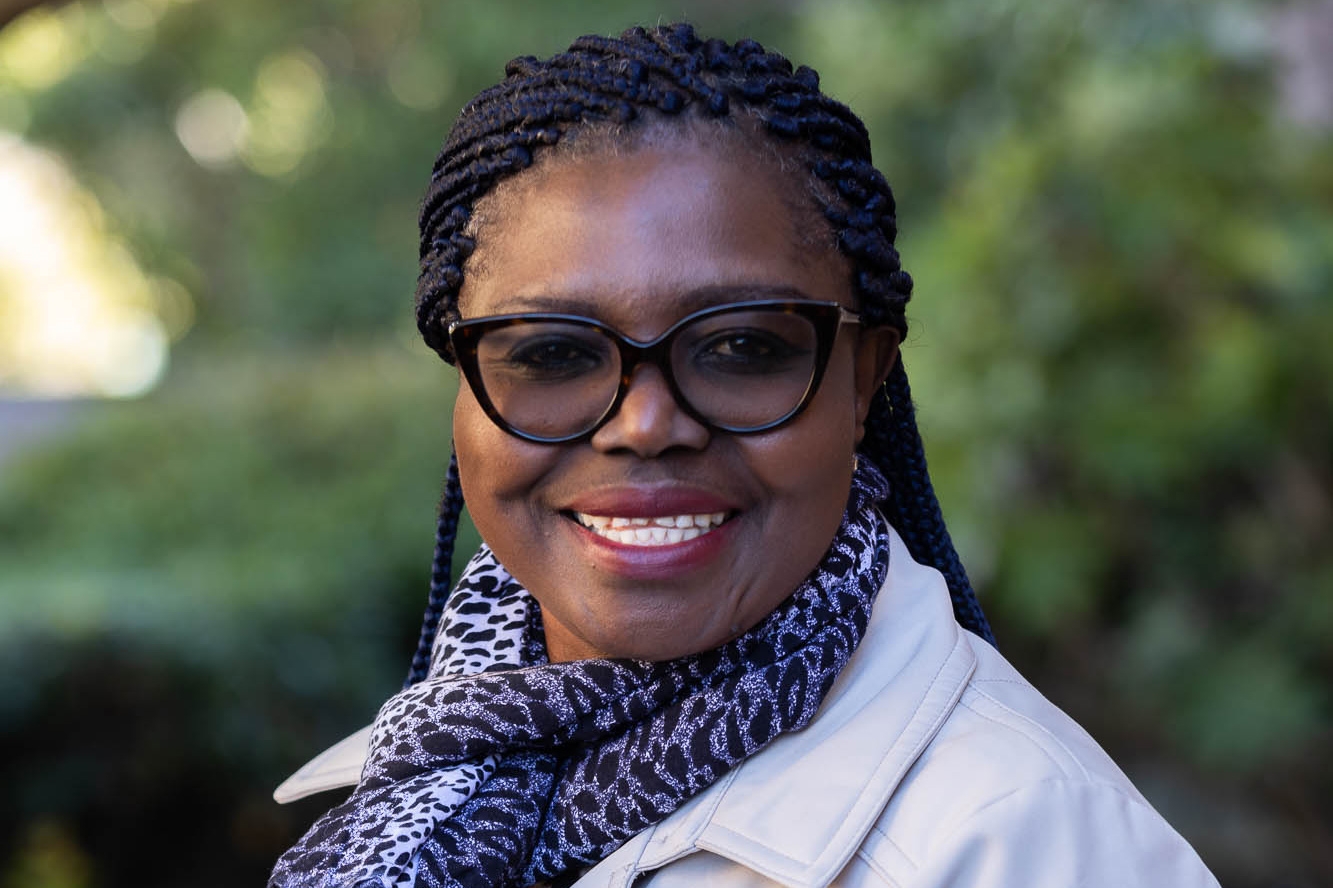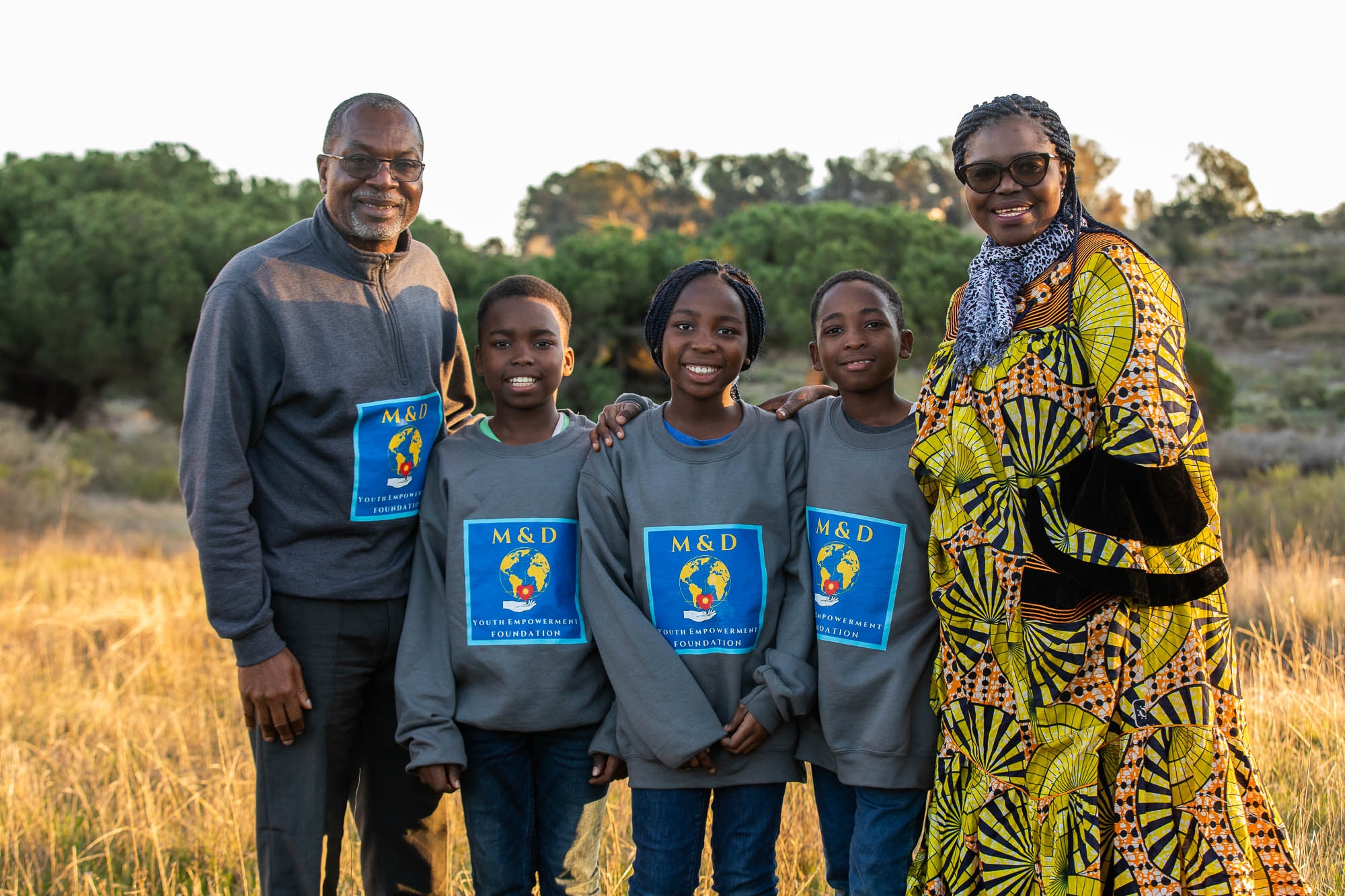
How visiting professor Elisabeth Ayuk-Etang fled war-torn Cameroon with her family — and what happens next
For Elisabeth Ayuk-Etang and her family, the horrors of the armed conflict surrounding their home in Cameroon had been mounting for years.
As a professor of African and feminist literature and chair of the English department at the University of Buea, Ayuk-Etang said she was targeted by separatists who viewed state employees as allies of the government. She was also part of the African country’s English-speaking minority, which made her safety even more precarious. Still, she carried on.
“I thought it was something I could brave my way through,” Ayuk-Etang said recently on campus at UC Santa Barbara, where she now teaches and lives with her family as a recipient of a humanitarian program that helps relocate threatened scholars. “We braved through it year after year. It did not dawn on me that we could actually leave.”
Detailing the violence leading up to the family’s move to UCSB, her memories of fear remained vivid.
She talked about her husband, Richard, a prominent architect, who survived being kidnapped for ransom in 2018 — and again two years later.
Pulling up her sleeve, she revealed a long scar along her left wrist, shattered by a bullet in 2019 during a burst of street violence. “I was targeted,” she said.
More pain surfaced as she blamed the early death of her hypertensive mother, in the spring of 2021, on the stress of unrelenting gunfire in her neighborhood.
Later that year, on the way to drop off her young triplets, Ayuk-Etang saw a woman on the street outside their elementary school, grieving over the body of a child killed by crossfire.
She struggled to sleep as the scene looped through her mind — What if the dead child had been one of my own?
The Cameroon she dearly loved had become a warzone of separatist factions clashing with the government and military. She prayed for peace and for courage.
A Path to Safety
In 2021, a few weeks after the tragedy outside the elementary school, Ayuk-Etang was on a call with Kum-Kum Bhavnani, a UCSB sociology professor who had been mentoring Ayuk-Etang through the African Feminist Initiative, a Pennsylvania State University program that fosters collaboration between feminist scholars.
“I was in a Zoom meeting with Elisabeth when I heard noises in the background — I wasn’t sure what they were,” Bhavnani remembered. “She explained the noises were gunshots and people screaming. I was totally taken aback. Elisabeth and her husband were clearly in danger, and their children were freaking out. I felt that this was unacceptable.”
Bhavnani also learned that in addition to the overt violence, anonymous callers had been threatening Ayuk-Etang and her academic colleagues.
“The psychological torment from the threatening phone calls were a continuous reminder that if I didn’t stop teaching, they would come for me,” Ayuk-Etang recalled.
At the same time, she added, the substantial ransoms paid for her husband’s releases from kidnappers had nearly crippled the family financially.
The coronavirus pandemic added another layer of fear and uncertainty.
As UCSB’s associate vice chancellor for global engagement, Bhavnani was familiar with Scholars at Risk (SAR), an international network of higher-learning institutions that can provide temporary teaching positions and housing for teachers and researchers facing grave threats to their academic freedom and livelihood. She called Claudio Fogu, a professor of Italian studies who had helped UCSB join the SAR network in 2016.
“We saw that Elisabeth was a prominent and established scholar, and that she was in an almost impossible position,” Fogu said.
Bhavnani also contacted Kathleen Moore, a UC Santa Barbara professor of religious studies and associate dean of humanities and fine arts, who also chairs the campus’s SAR faculty committee.
“Kum-Kum came to us with Elisabeth’s story,” Moore said. “From the committee’s point of view, she was a fit. There was a lot of overlap between her experience and the range of students she might be able to teach and mentor.
“Elisabeth’s research and teaching interests play to our campus strengths in environmental studies, comparative literature and feminist studies,” Moore continued. “Her specialties that caught our attention include her interdisciplinary approach to gender-based violence, race, feminist thought and the environment, and we thought her focus on Black women's writing, including creative writing, would be a welcome addition to the humanities curriculum.”
Landing a new job at a host university was only part of the puzzle, however; paying for it was another.
For starters, with Bhavnani’s guidance, Ayuk-Etang secured $25,000 from the Scholar Rescue Fund (SRF), a global program launched in 2002 by the Institute of International Education (IIE) to arrange, co-fund and support fellowships for threatened and displaced scholars. UCSB joined the IIE-SRF Alliance, a global network of individuals and institutions committed to providing these scholars with practical support.
From there, the fundraising to bring Ayuk-Etang and her immediate family to campus expanded to include generous help from the Office of the Executive Vice Chancellor, the College of Letters & Science council of deans, the UC Santa Barbara Faculty Association, a GoFundMe campaign and several anonymous gifts. It worked.

Once they arrived, on April 28, 2022, in-kind donations — groceries, a used car, plus new bikes and eight weeks of summer camp for the triplets — helped them settle into their new surroundings more than 8,000 miles away from home. For two months they lived in a house donated rent free until a North Campus faculty home opened up in June.
“My family and I are grateful for the ongoing support from this community,” Ayuk-Etang said. “Before we came here, we were very traumatized. Now I can walk into my office without fear.”
“Above all,” she added, “I want to thank my students. There are days when I am troubled by my past experiences, and they can see that. But they will always put a smile on my face. What a wonderful community.”
During the fall quarter, Ayuk-Etang taught “Black Women Writings in a Social Context,” covering the experiences of Black women from Africa, the Caribbean and America. The coursework also touched on slave narratives, including Harriet Jacobs’s “Incidents in the Life of a Slave Girl” and Toni Morrison’s “Beloved,” and on post-slave narratives, including Zora Neale Hurston’s “Their Eyes Were Watching God.” Her students also read poems by Maya Angelou and the work of Caribbean writers Edwidge Danticat and Jamaica Kincaid and African writers Chimamanda Ngozi Adichie, from Nigeria, and Zimbabwe’s Tsitsi Dangarembga.
“As a student in college, my focus was interdisciplinary, with a broad spectrum of concepts analyzed with literary texts as well as creative works — for instance, the combined study of literature and environment and African eco-spirituality.”
This winter Ayuk-Etang is teaching “Issues of Ecofeminism in Africa,” a graduate course in the Department of Sociology.
What Happens Next
The original arrangement through the IIE-SRF Alliance and SAR network provides the Ayuk-Etang family a one-year reprieve from the violence back home.
“I pray for peace in Cameroon,” she said recently. “If things get better, we’ll go back. But we understand that things have been getting worse.”
On top of that, she is unsure if a position at the University of Buea will be waiting for her upon return. She keeps it in perspective. “The fear is not for the job I may not have back home,” she said. “The fear is for my life.”
Ayuk-Etang and her husband Richard also recognize an irony in their situation — one that’s not to be taken lightly.
“If we go back,” Richard explained, “we could be viewed negatively by the government because we choose to leave.”
At the same time, he added, they would be viewed as a prime target for any separatist faction — a wealthy family that was able to escape to America.
“We would be caught in between,” he said. “We would have to navigate very difficult terrain.”
The wheels are in motion to extend their stay on campus. Housing is secure through June 30, but it’s uncertain if Elisabeth’s teaching appointment will be extended through spring quarter, Moore said recently. “We’re still working on funding sources.”
Beyond that, the plan is for Ayuk-Etang to relocate to another host university. The success of that effort remains to be seen.
(805) 893-3207



